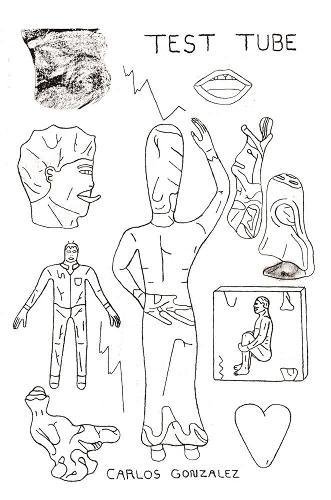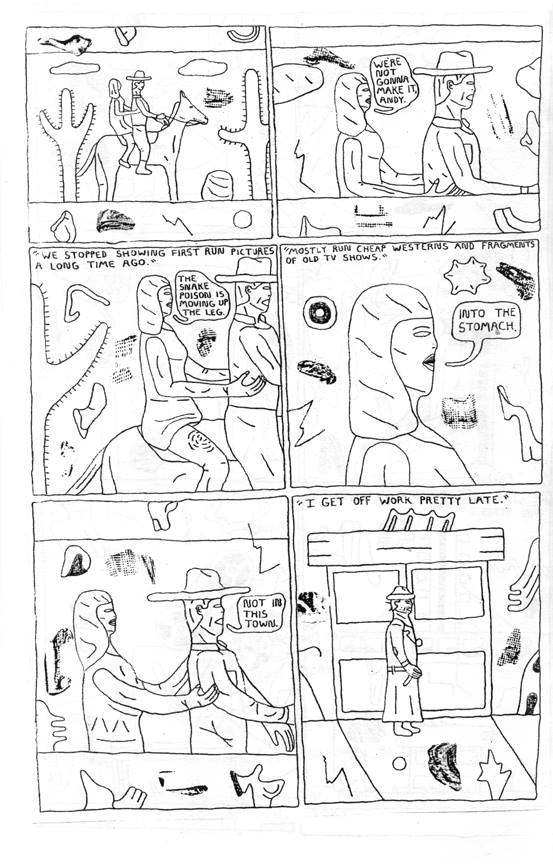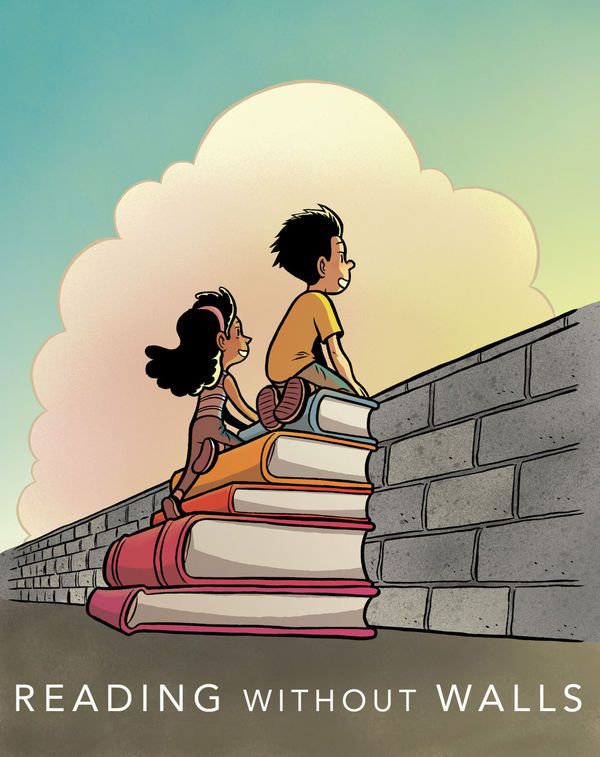Sam Ombiri on Carlos Gonzalez’s Test Tube, Meg Lemke and Gene Luen Yang in conversation, and a bit more diversity in comics news.
—————————————————————————————————
Sam Ombiri here: I have been reading Test Tube by Carlos Gonzalez, and this comic feels like it’s mutating me and my reality. I wasn’t aware that a comic can wrap around my brain. It did this by using very familiar images, with unfamiliar modes of presentation that somehow mysteriously register. Carlos is bringing to attention how unfamiliar these familiar drawings are. He’s somehow simultaneously doing so much and so little to convey what objects, characters, and settings are, yet it all somehow renders so clearly. Which I guess is cartooning, but there seems to something in this system Carlos has introduced. He’s really mastered manipulating our mind at the bare minimum, but with the effort in design turned up to the maximum, to indicate at every turn of the story that something’s afoot. It also could just be satisfying at an aesthetic level. On my end it’s great to look at, but it simultaneously conveys the nature of the story.
From what I’ve seen, it seems when Carlos is making comics he’s not always fully aware of where the story’s going to go. Of course there’s always an element of improvisation with most every art form. Whether it’s at the beginning or later down the road in the whole process, there’s always an element of improvisation. For Carlos it seems to be late in the whole process. Where it’s too late to make changes as a result of committing to a certain feeling. He seems to sacrifice control in order to stay true to the feeling he set out to express. For some makers this can cheapen their work, but it’s not the case for Carlos. I think it’s how welcoming and sensitive he is to surprises – these surprises that come along the way, that I’m guessing he ran with because of his commitment to satisfy that longing for a complete story. That’s what I get personally as a reader. It’s not just the way the story plays out – the jokes have this immediate, intuitive, and spontaneous punchiness to them that isn’t in anyway contrived.
After wandering back and forth, back and forth through these characters lives, the story all leads to an event, unexpectedly. The way Carlos introduces us to all these elements that will eventually take shape is brilliant – he starts with when the event has already taken place, and then the one character whom we are familiar with is recounting. I was pretty sure I wasn’t going to be shocked, after seeing all the strange things that had happened to the characters before what happened towards the end. By the time I got towards the end of the book, I was convinced there wasn’t anything stranger that could happen.
I was wrong.
I had to know that something had to be building up. I did, but I didn’t expect it to be a smallish incident. Towards the end of the book the characters don’t feel like pawns in a big sci-fi epic as they did at the beginning. I imagined the book going that direction, that it’s in this claustrophobic, personal macro state, and it’ll expand and expand. However, the story to my surprise and to my delight stayed in the same scale, no matter what was going on. So even this scientist’s big experiment felt like a homemade experiment. “Low key” is the word for the event towards the end of the story, that’ll supposedly continue in our world. I was thinking about the ending to Videodrome – of course if you watch that movie in Pittsburgh, that movie’s going to have an even stranger effect on you. Basically Carlos made it seem like this character is somewhere out there, and she’s gotta do this thing to survive emotionally, so I sympathize with her, even though she’s going doom us all. Maybe I ought to be more optimistic about this higher form she’s going to turn us all into.
Read this book if you can, you’ll be glad you did. There’s also a really cool intro by Noel Freibert at the beginning that’ll make you even more confused about this book than you thought you could be. Noel told me he included some stuff from knowing Carlos into the intro, so it might function more to introduce the reader to Carlos more than the book itself, which made it make more sense. – Sam Ombiri
Get a copy of Test Tube by Carlos Gonzalas HERE.
For another review of this comic, read Anya Davidson’s thoughts on The Comics Journal – HERE.
—————————————————————————————————
Sally here – Mege Lemke interviews Gene Luen Yang, the National Ambassador for Young People’s Literature, over on Mutha Magazine. They talk about his project Reading Without Walls, and it’s mission to get kids and parents “exploring books about characters who look or live differently than you, topics you haven’t discovered, or formats that you haven’t tried.”
They talk about how to get reluctant readers to read, how kids are now usually allowed to read comics in school, and the big issue of diversity in comics/publishing as a whole.
“MUTHA: What’s your take on this: As I’m sure you’re aware, there’s a real focus in young adult publishing community right now on responding to the criticism from the Own Voices Movement, essentially the idea that there needs to be more space for people of color and people of different sexualities to write their own stories. Resulting in pushback against, say, white writers writing as another character of color, but also characters of color writing other characters of color. This has caused writers to become cautious about writing across cultures.
GENE LUEN YANG: Here’s how I approach it. In my own writing life and in my work teaching writing, I believe that writing is an act of bravery. You have to get over so much fear just to put your story on the page. Facing that blank page is terrifying. When I sit down to write, I’ll want to do anything else. I’ll want to go wash dishes, I’ll want to go reorganize my label collection, anything, right? I am very reluctant, especially when I think about my students, of introducing more fear in their heads.
So, I would never tell a writer that they cannot write outside of their experience. I almost think that it’s the defining job of a writer to be able to go outside of their own experience.
But I would say: don’t let that fear that you feel allow you to stop writing the story you want to write. You should let that fear drive you to do homework. You should let that fear drive you to humility. Approaching experiences that aren’t your own with a certain humility.
Including people who are insiders into your support group, either as editors or as beta readers. There is a greater responsibility.
However, you’ll see like 80 percent of the stories told about minority demographics are told by outsiders. That is a problem. That is a problem.“
Yang goes on to say that ultimately it is on the publishers, the gatekeepers, to make sure they are publishing work by POC creators and not just asking their “stable” of white writers to toss some diversity into their work.
Plenty of other interesting notes in the interview – read it HERE.
—————————————————————————————————
Speaking of a white writer tossing some diversity into their work, The Comics Reporter has a breakdown of the recent shocker from Marvel’s new Editor-in-Chief, CB Cebulski – he once wrote comics under the pseudonym Akira Yoshida, and had a whole secret identity for this person. Understandable uproar has ensued. Tom Spurgeon writes:
“Comics culture is not just a roll-your-eyes cattle prod these days, it’s as under fire as any individual publishing move. Rightfully so: comics culture dictates a lot in terms of how our industries operate. This latest looks like a series of actions possible only in the context of a broken professional culture. This is not just the case of a freelancer adopting a pseudonym to get more work. This was someone giving themselves work that could have gone to someone else, and creating a context for that work more attractive than the work would be by itself. By assuming a Japanese identity and writing stories soaked in orientalist stereotypes, Cebulski and Marvel slipped any blame that might be theirs for the content of such work, and avoided criticism for the general breakdown of creators being hired by the company. “
Read the rest of the story HERE.
—————————————————————————————————
Joanie and Jordie – 11-30-2017 – by Caleb Orecchio



